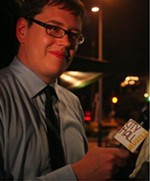City Counseling: CU L8R, Texters!
Technology takes a backseat to safety
By Wells Dunbar, Fri., Oct. 30, 2009
The long-bandied-about texting ban passed unanimously, albeit with several speakers in opposition. The first, Chip Rosenthal, software developer and chair of the city's Community Technology and Telecommunications Commission, spoke for other opponents in that he didn't oppose a texting ban in general but had questions about the amendment's broad language (e.g., "ELECTRONIC MESSAGE means a self-contained piece of digital communication that is designed or intended to be transmitted between physical devices"). "This ordinance is largely misunderstood by the public," Rosenthal said. "This has been portrayed to the public as a ban on texting while driving where in fact it is actually a wide-ranging ban on the use of cellular data and instruments that use that data" – problematic when new data devices are dreamt up daily. "I mean, an Amazon Kindle is a wireless communication device under the grounds of this ordinance; you can imagine future devices will be emerging that fit under this ordinance." Worried texting's not distracting enough? Why not power through Infinite Jest on I-35! (The language does exempt specific devices, like GPS navigators mounted in the car.)
Rosenthal suggested the ordinance be punted to the Urban Transportation Committee for a once-over; Laura Morrison subsequently offered a substitute motion that would postpone the item to Nov. 5, allowing the council's Emerging Technology and Telecommunications committee to glance it over. The motion failed, 2-5, with Morrison and Bill Spelman voting aye. Prior to the vote, Lee Leffingwell seemingly spoke for the majority when he said: "I really don't see it as a technology issue. I see it as a safety issue. Maybe that's an oversimplification. But I think that it really boils down to ... causing distraction to drivers." (On the same day, council approved a "vulnerable road users" ordinance, similar to the safe-passing bill vetoed by Gov. Rick "Pave It!" Perry, requiring distance between motorists and bicyclists.)
Ultimately, Mike Martinez split the baby, moving that the ordinance be approved as written, but not go into effect until Jan. 2, 2010 (instead of the previously scheduled Nov. 2). That way, Martinez said, "in these next six weeks, if Council Members Morrison and Spelman and other folks want to talk about it and potentially propose amendments," they can. Martinez also said the time should be used for outreach, to alert citizens of the ban, what it covers, and more. How about the fines: more than $500 on your first penalty? TTYL!
Drawing Blood
The other controversy célèbre, Item 42, came from council (Spelman, Leffingwell, Morrison) and would have prevented Austin Police Department officers from personally conducting phlebotomies (blood draws) on suspected DWI motorists. Texans for Accountable Government spokesdude John Bush testified in support – albeit without the jaunty Lone Ranger-style mask he wore when speaking last time – as did local ACLU leader Debbie Russell. However, the black box known as the city legal department put the kibosh on the party before it even started. As Assistant City Attorney David Douglas told Spelman, the original ordinance came into conflict with state law, as the ban on collecting blood interferes with police requirement they "shall use all lawful means" to enforce the law. (Somewhere there's a Bill Hicks routine in all this.)
With the original resolution out of bounds, according to legal, Spelman's alternate resolution stated it was the council's "clear will" that police not capture blood themselves; it passed 7-0. And council received a pledge from Assistant Police Chief David Carter that "we have not trained anybody nor are we currently seeking to train anybody. ... We do not expect to train anybody in this issue." Still less than might make some comfortable – and once again, thanks to city legal and the Dick Cheney-esque guidance of City Attorney David Smith, who couldn't envision any procedure more inventive in expressing the public will. It's of a piece with their recent decision that citizen communication speakers signed up with a catchall topic (say, "city issues") can't be addressed by the council, because somehow it's a violation of the Open Meetings Act. At least when they come to quashing the vox populi, they're consistent.
Got something to say on the subject? Send a letter to the editor.










